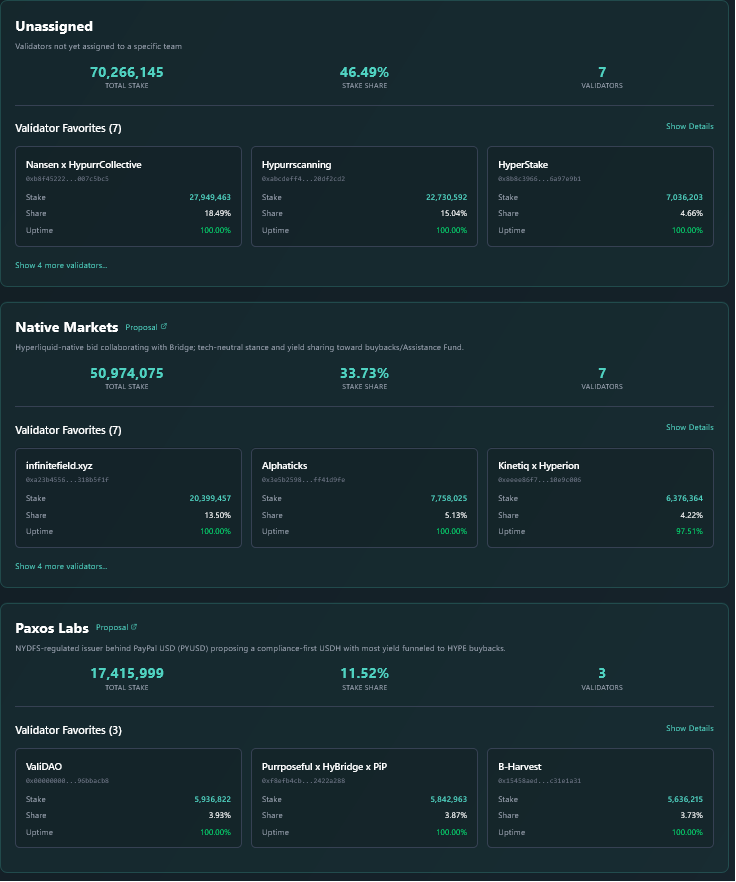Actual-world asset tokenization platforms Openeden and Crypto Infrastructure Supplier Bitgo have taken half within the race to difficulty Hyperliquid’s deliberate native Stablecoin, USDH, bringing the variety of candidates to eight.
The excessive lipid validation gadget will start voting for USDH proposals beginning Thursday and can have the ability to vote till Sunday. Different suitors embrace Ecena, Paxos, Flux, Agora, Native Market and Sky.
In response to Defillama, the successful bid decides the way to handle Hyperliquid’s $5.9 billion Stablecoin Reserve, with 95.56% of that being held at USDC (USDC).
Openeden’s bid for USDH
Openeden founder and CEO Jeremy Ng on Wednesday defined the platform’s options on the way to deal with USDH to beat VID.
The RWA platform has dedicated to distributing all yields generated from the USDH reserve into excessive lipid ecosystems, together with buybacks.
Moreover, the income from USDH development and redemption is used to purchase again Hyperliquid hype tokens and distribute them to excessive lipid verification gadgets.
The corporate supplied extra incentives by including 3% of its native Eden Token Provide.
The USDH reserve is stored within the tokenized US Treasury Invoice Fund, and its custody is below the Financial institution of New York Mellon.
The corporate companions with New York Mellon Financial institution, Chainlink, Aeon Pay and Monarch Asset Administration for adoption.
Bitgo promotes regulatory expertise
In the meantime, BITGO mentioned it should make the most of US dollar-backed liquid property, financial institution deposits and short-term Treasury payments to solid and redemption USDH.
The corporate mentioned it should use chain hyperlink cross-chain interoperability protocols to keep up interoperability between chains.
Yields from the underlying property are used to buy and guess tokens of hype, and the corporate receives a 0.3% payment for the whole reserve.
As six corporations acquired the marketplace for Crypto-Property licenses from Dubai, Singapore, Denmark, New York and Germany, Bitgo touted regulatory compliance as a significant power.
Associated: How the typical quantity reached $300 billion in month-to-month buying and selling quantity with simply 11 workers
The Native Market Leads the Pack
On the time of writing, Native Market has acquired essentially the most votes, with 33.73% of its consultant property selecting its proposal.
The native market, co-founded by neighborhood member Max Fiege, has proposed splitting revenues from the reserves, with half of the income getting used to purchase again hype tokens and the opposite half being granted to the help fund. Nevertheless, the proposal has been hit with the neighborhood.
Haseeb Qureshi, managing accomplice of Crypto Enterprise Fund Dragonfly, has raised questions concerning the native market bid.
“We have heard from a number of bidders that nobody within the validator is fascinated with contemplating individuals exterior the native market. It is not even a severe argument, as if there is a backroom deal occurring,” Qureshi mentioned.
Nansen CEO Alex Svanevik has rebutted the declare, saying they’re working with bidders together with allies and inspired them to submit proposals to make the bidding course of aggressive.

The dashboard exhibits the native market main the vote. sauce: USDH Voting Monitoring Dashboard
Paxos Labs, which submitted its revised bid on Wednesday, is at present second in a vote share of 11.52%.
Nevertheless, 46.49% of the shares stay unallocated, which might considerably alter the outcomes of those that create the USDH token.
Multi-tiered votes present that market individuals primarily anticipate native markets to win the proposal.
Different bidders embrace Ethena Labs, which submitted the proposal on Tuesday, and former marker Sky submitted the proposal on Monday.
journal: Meet the co-founders of Ethereum and Polkadot, who weren’t Time Journal


